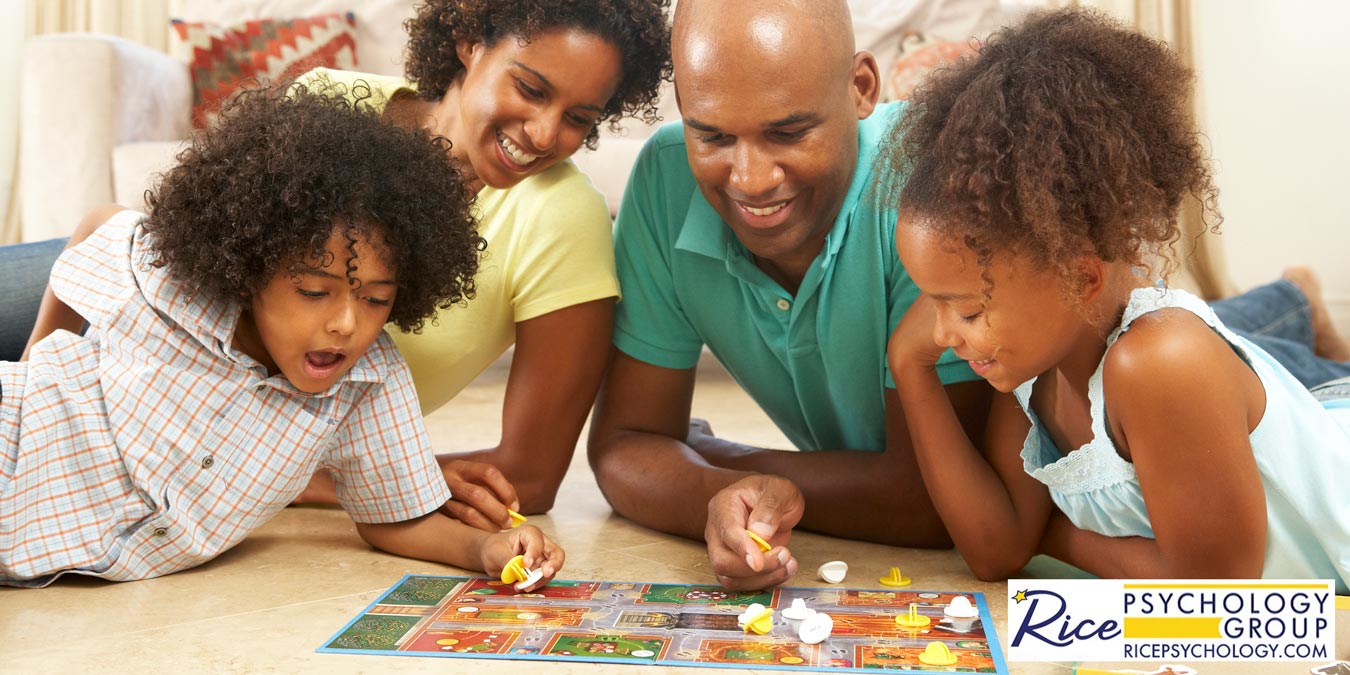Last week, I decided to get a head start on my spring cleaning and found some old board and card games my siblings and I used to play back in the day. The discovery instantly put a smile on my face, but I couldn’t help but feel a little uneasy at the fact that my children haven’t been exposed to classics such as Sorry!, Clue and Uno. It seems like today’s kids would rather spend their downtime playing video games or on their phones, but is there really no going back to board games? Do they even have anything to offer the young minds of today?

Board games have been a staple of life for families across the nation since the early days of Monopoly, The Game of Life and Clue, and for good reason too! While they tend to bring families together and provide loads of fun, some of their other benefits can be a bit harder to notice. At Rice Psychology Group, we believe that kids can learn a lot from a board game, which is an excellent reason to dust them off and reintroduce them to your living room table.
Want to learn more about the ways your child’s mind can be stimulated? Rice Psychology Group of Tampa is here to help!
A Winning Combination
While each game comes with specific benefits, they’ll provide plenty of lessons for your children to reflect on and learn. According to Fernand Gobet, Chess International Master and cognitive psychologist, games can encourage kids to consider the concept of rules, practice following them and reason about moral problems. They can additionally learn how to win and lose with grace by playing against older and more experienced role models. Classic games such as Chess, Stratego and Mancala encourage players to identify patterns, strategize, predict outcomes and learn from their experiences.
If board games haven’t been a regular part of your life, it’s never too late to start! Click To Tweet
The next time you and your family decide to crowd around the table for game night, take pleasure in knowing that your kids will be having fun while gaining the following benefits:
- Memory Formation and Cognitive Skills – Games especially benefit the hippocampus and prefrontal areas of the brain. These are responsible for complex thought and memory formation.
- Reducing Risk of Mental Illness – Games help reduce the risk of cognitive decline by keeping the mind engaged and strengthening it.
- Reducing Stress – Yes, even your kids can become stressed, and what better way to occupy the mind and relax than with a quality game night?
- Therapy Treatment – The use of coordination and dexterity through fine motor skills is required in many board games. These basic skills can be developed and greatly improved with regular play time, which is something that benefits children, the elderly and people recovering from a mental or physical issue.
A Good Starting Point
If board games haven’t been a regular part of your life, it’s never too late to start! The psychologists of Rice Psychology Group recommend a family night filled with games such as Chess, Checkers, Life and Clue. We especially suggest that you play a few rounds of Monopoly, which has been used to teach financial principles to students, and Scrabble, which has shown to strengthen verbal skills.
There’s no better way to strengthen your child’s development than by having fun while doing it! Click To Tweet
More than Just a Game
There’s no better way to strengthen your child’s development than by having fun while doing it! It’s time to dust off those old board games in your closet and put them to good use with your friends and family. At Rice Psychology Group, we understand your need to provide your children with the tools they need to lead a wholesome life. If you feel like you need additional advice or if you’re looking for answers to some of your most difficult questions, give our group of psychologists in Tampa a call.

